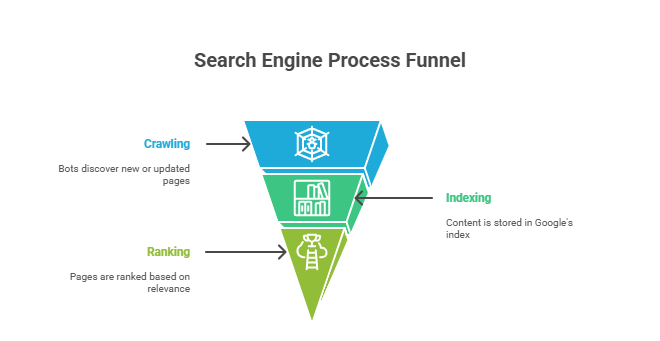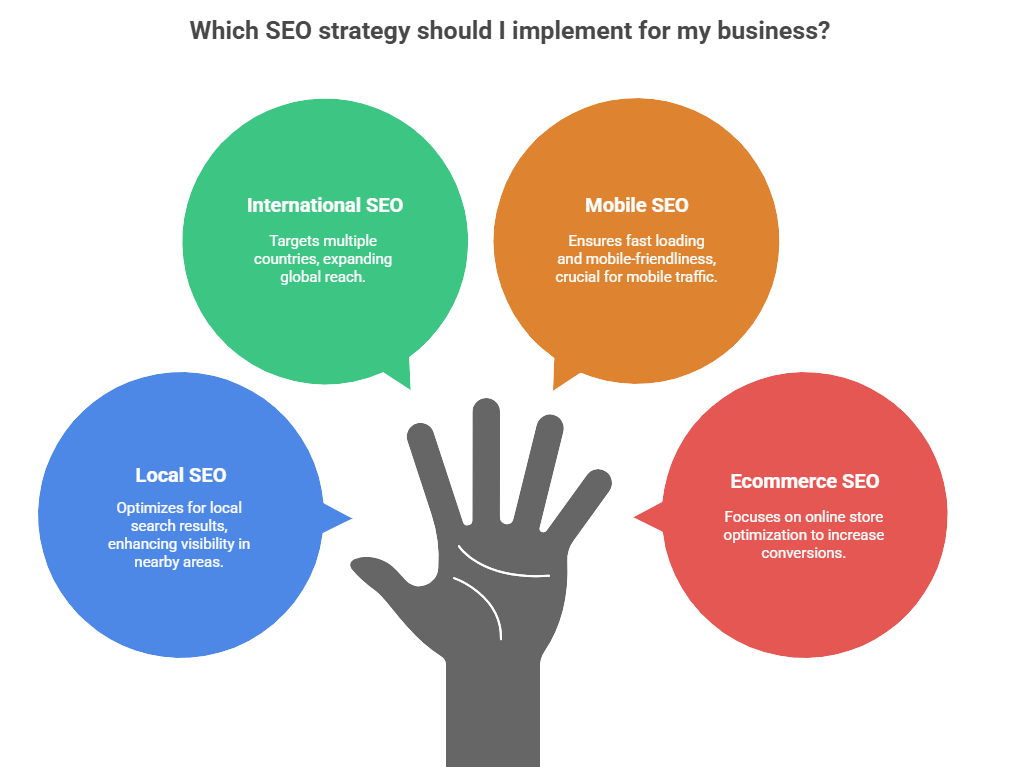If you’ve ever searched something on Google and clicked one of the top results, you’ve already seen SEO in action. But what exactly is SEO, and why does everyone in digital marketing keep talking about it?
SEO isn’t just about ranking higher on Google. It’s about making your website easier to find, more useful to visitors, and more trusted by search engines. Whether you run a small business or a big brand, understanding SEO can be the difference between staying hidden online or becoming the go-to choice in your industry.
In this blog, we’ll break down what is SEO, why it matters in digital marketing, how it works, and the strategies that actually bring results in 2025.
What is SEO?
Let’s start simple. SEO stands for Search Engine Optimization. It’s the process of improving your website so search engines like Google can understand it better and show it to people when they’re looking for something related.
Think about it. When you type “best running shoes” on Google, thousands of websites could be selling shoes. But Google won’t show them all. It shows only the ones it believes are most relevant, trustworthy, and useful. SEO is how you make sure your site ends up in that list.
Now, here’s the thing—SEO isn’t about tricking Google. It’s about making your website better for users and easier for search engines to crawl and rank. That means creating high-quality content, improving site speed, fixing technical errors, and earning links from other trusted sites.
So, if you’re seeking what is SEO in digital marketing, the answer is simple: it’s one of the most effective ways to get free, consistent traffic from search engines without paying for ads.
Why SEO Matters in Digital Marketing
Digital marketing has many parts—social media, ads, email, influencer promotions. But here’s why SEO stands out: it brings long-term traffic without paying for every single click.
When your website ranks higher, you build trust. People tend to believe Google’s top results. A well-optimized website not only brings in more visitors but also increases conversions, sales, or leads.
Unlike ads, which stop the moment you pause your budget, SEO keeps working. That’s why every smart business includes SEO in their digital marketing strategy.
How Search Engines Work

To understand SEO, you need to know how search engines actually work.
Here’s the breakdown:
- Crawling – Search engines send bots (called crawlers) to scan the internet and discover new or updated pages.
- Indexing – Once discovered, the content is stored in Google’s index (its giant library).
- Ranking – When someone searches, Google looks through its index and ranks pages based on relevance, quality, and trust.
So, when you search “what is seo,” Google instantly checks billions of pages and shows the most useful ones.
Key factors that affect ranking:
- Keywords used in content
- Website speed and mobile friendliness
- Quality backlinks from other websites
- Fresh, engaging content
In short, search engines are matchmakers. They connect people’s questions with the most reliable answers.
Also Read : Exceptional Requests to Reduce Crawl Rate: A Complete Guide
Core Components of SEO
SEO has three main pillars. Let’s break them down in a simple table first:
| Component | What it Means | Why it Matters |
| Technical SEO | Optimizing backend structure | Helps search engines crawl and index your site |
| On-Page SEO | Optimizing content & pages | Makes your site relevant for keywords |
| Off-Page SEO | Building authority through links | Boosts trust & rankings |
Now, let’s explore each one.
Technical SEO
This is the foundation. Even if your content is amazing, poor technical SEO can block you from ranking.
Examples:
- Site speed optimization
- Mobile responsiveness
- Secure browsing (HTTPS)
- Fixing broken links and crawl errors
- Using proper XML sitemaps
Think of it like a building. Technical SEO is the base structure. Without a strong base, everything else falls apart.
On-Page SEO
On-Page SEO is all about what’s on your website.
Examples:
- Using keywords naturally in titles, meta descriptions, and headings
- Writing high-quality content that solves user problems
- Optimizing images with alt text
- Adding internal links for better navigation
For instance, if your page is about “what is SEO,” your title, headings, and content should clearly explain it without stuffing the keyword everywhere.
Off-Page SEO
This is how the world sees your site. The main factor here is backlinks—other sites linking to yours.
Examples:
- Guest posting on trusted blogs
- Getting mentioned in news sites
- Social sharing and brand mentions
The more quality links you earn, the more search engines trust your site. It’s like reputation-building in real life.
Different Types of SEO

SEO isn’t one-size-fits-all. Different businesses need different approaches.
Local SEO
Local SEO helps businesses show up in local searches, like “coffee shop near me.” It involves Google Business Profile optimization, local keywords, and customer reviews.
International SEO
For businesses targeting multiple countries. This involves using hreflang tags, country-specific domains, and region-specific content.
Mobile SEO
With most traffic coming from phones, your site must load fast and be mobile-friendly. Google uses mobile-first indexing now.
Ecommerce SEO
For online stores. It includes optimizing product pages, category pages, reviews, and improving site navigation to boost conversions.
SEO Best Practices in 2025
SEO keeps changing, but a few best practices always work:
- Prioritize user intent – Write content that directly answers questions.
- Optimize for mobile – Most users are on phones, so mobile SEO is non-negotiable.
- Use AI tools wisely – Tools like ChatGPT or SurferSEO help in keyword research and content ideas.
- Improve Core Web Vitals – Site speed, stability, and responsiveness matter for rankings.
- Build authority – Earn backlinks from trusted sites in your niche.
- Don’t ignore video SEO – YouTube results often appear on Google.
- Regular updates – Keep your content fresh and relevant.
Example: A business blog that hasn’t been updated since 2018 won’t rank well compared to a blog with recent, in-depth articles.
Also Read: 9 Powerful SEO Content Prompts to Boost Your Website’s Ranking
Common SEO Mistakes to Avoid
- Keyword stuffing (using the same keyword too many times)
- Ignoring technical SEO errors
- Copying content from other sites
- Skipping mobile optimization
- Neglecting analytics and not tracking performance
- Buying spammy backlinks
Avoiding these SEO mistakes can save months of wasted effort.
The Future of SEO (AI, AEO, GEO)
SEO is moving beyond keywords.
- AI (Artificial Intelligence): Google is using AI to understand context better. Tools like ChatGPT are also changing how people create content.
- AEO (Answer Engine Optimization): With voice search and featured snippets, users want direct answers. Optimizing for Q&A style content is the future.
- GEO (Generative Engine Optimization): Search is becoming conversational. Platforms like Google’s SGE (Search Generative Experience) will show AI-generated results, so businesses must adapt their content for AI summaries.
Example: Instead of ranking for “best running shoes,” your site might appear as part of an AI-generated answer box.
SEO Tools & Resources
| Tool | Features | Use Case |
| Google Analytics | Tracks traffic & user behavior | Measure SEO success |
| Google Search Console | Shows indexing & ranking issues | Fix technical errors |
| SEMrush | Keyword & competitor analysis | Research opportunities |
| Ahrefs | Backlink analysis, keyword data | Off-page SEO |
| Screaming Frog | Site crawling | Technical SEO |
| Ubersuggest | Keyword ideas, content suggestions | Beginners |
Also Read : Best SEO Tools for Beginners: The Ultimate 2025 Guide
Conclusion: Why SEO is Essential
SEO is no longer optional. It’s the backbone of online visibility. Whether you run a small business or a global brand, SEO helps you get discovered, build trust, and grow sustainably.
If you’re serious about digital marketing, don’t just ask what is SEO—start applying it. And if you’d like expert help tailored to your business, check out our SEO services in Delhi.

Sure! Here’s a short author bio written in first person:
I’m Shivam Panchal, an SEO expert and digital marketer from Delhi. I run SEO Shades, where I share practical SEO tips, link-building strategies, and website growth hacks. With over 3 years of experience, I help businesses boost their online visibility and rank higher on Google.


